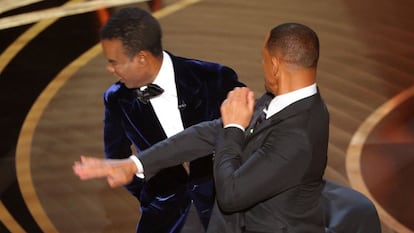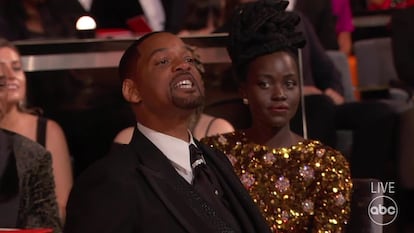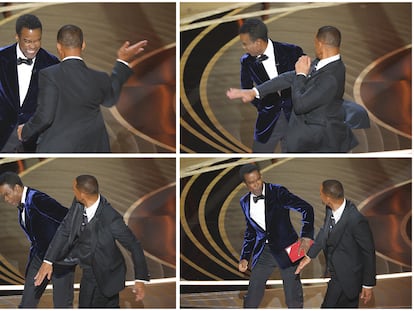Anatomy of a slap: Seven sexist elements of Will Smith and Chris Rock’s confrontation
From the joke to the reaction on social media, the incident highlights the patriarchal attitudes that are still present in society today
First came the joke and then the slap. But there was also the reaction from the audience, the speech, the cheers, the Academy’s attitude, the response of Hollywood’s elite at the post-gala party and the social media trends. All these elements suggest that part of society not only supports Will Smith for slapping Chris Rock at the Oscars, but celebrates him for it. The joke about Jada Pinkett Smith was overshadowed by violence. Those who disagree with Smith’s actions, say “he flipped out,” and go no further. But explaining it away as “flipping out” is what irrepressible desire is to sexual violence – a fallacy used to justify the aggression that only serves to diminish his responsibility and take focus away from the true origin of what happened on that stage: sexism.
Chris Rock is 57 years old and has been working in entertainment for 38, while 53-year-old Smith has been in the business for 35 years. That’s a lot of red carpets, interviews and awards ceremonies, among other situations in which one may feel tempted to slap someone. But it happened on Sunday night on the stage of the most important awards in cinema, the space that creates the culture that nourishes and molds society. What’s behind these actions? Many symbols of the patriarchy. Here’s a breakdown of all the sexist elements of the confrontation.
1. The joke
After referring to Spanish actors Javier Bardem and Penelope Cruz as “Javier Bardem and his wife,” Chris Rock – who is on stage to present the award for Best Documentary Feature – looks at Jada Pinkett, who is married to Will Smith and sitting at his side, and says: “Jada, I love you. GI Jane 2, can’t wait to see it.” The joke is a reference to the 1997 movie GI Jane, starring Demi Moore as Jordan O’Neil, a character who shaves her head to cement her status as a Navy Seal.
Much has been written about the limits of humor. It’s important to keep freedom of expression at the forefront of these discussions, but this was an instance of body-shaming. Rock made a joke about the physical appearance of a woman who didn’t decide to shave her head, but rather suffers an autoimmune disease that causes hair loss. Pinkett has spoken publicly about her struggle with alopecia, bringing visibility to a condition that afflicts 30% of all women at some point in their lives and 55% of women over 70.
Was it necessary? Did Rock intend to support Pinkett in some way? And, if so, could he have chosen another way to do it? Did the presenter think the reference to Demi Moore’s character was accurate? On the surface, OʼNeil is a strong, tough woman who uses those qualities to maintain her position as a Navy Seal. She becomes accepted by the men when she behaves like them, mirroring their verbal and physical violence. Only when she tells her instructor, “suck my dick,” does she truly join the boy’s club.
Rock, and those who wrote, reviewed and approved that script, decided that humor was more important than being sensitive about Pinkett’s disease. And they failed to analyze the emotional and psychological impact that alopecia can have.

Hair loss is an issue that concerns both men and women. But for women, it also comes with additional social pressures created centuries ago by male artists. Hair connoted – and still connotes – health, femininity, identity and beauty. In the past, it has been a symbol of wealth and social status, and even today, it remains a marker of gender. In the foreword to Hair Stories, art consultant Emily Lambert-Clements writes: “Still today, it is seen by both men and women as a sign of female sexual identity.”
Mar Venegas, a sociology professor at the University of Granada in southern Spain, points to “the ongoing eroticization that long hair brings.” In an academic paper on alopecia, published almost two decades ago, the authors wrote: “Regardless of its appearance or structure, a woman’s hair plays an essential role in her image and is considered one of her most important physical attributes. Specialists recognize that women take on this issue [hair loss] with as much concern or more, if possible, than men. It produces a lack of self-esteem, insecurity and withdrawal.”
2. The reaction
At no point did Pinkett laugh at the joke. Smith did, at first. It is only later – or so it seems, because the video shows a few seconds of silence – when he sees her, already upset and focused on by the cameras, when he gets up, walks calmly to the stage and slaps Rock with his hand open. The presenter blurts out: “Wow, Will Smith just slapped the shit out of me.” Smith returns to his place, straightening his tuxedo vest. Once seated, the actor yells twice: “Keep my wife’s name out of your fucking mouth!”
Did he do it because he was offended by the joke or because he felt some responsibility for Pinkett’s discomfort at his laughter? Did he slap Rock for what he had said or to make amends for his own reaction? Did it have to do with Pinkett’s pain or how he looked on camera laughing at the joke? Was it just sexism or was it also ego? Amparo Tomé, a Spanish sociologist and researcher specializing in feminism, says that “in any case, the one who could get up to say something, if she wanted to, was her. The violence should never have occurred, but to say something in reply, it should have been her, not him.”
If Smith hadn’t gotten up, Pinkett’s face would have been enough to open a debate about the appropriateness of jokes about illness. Rock would have been the focus of that discussion. But Smith got up.
Author Octavio Salazar analyzed Smith’s actions in a column published Monday in this newspaper, writing: “Will Smith’s reaction to an unfortunate joke by Chris Rock contains all the elements of the model of masculinity that continues today to be the main obstacle against building a world without gender inequality, where violence is no longer legitimized. A violence that is connected to power, to the omnipotence in which men have been socialized and to the assumption that there is no better way of managing conflict than resorting to force. Violence still remains for many a mechanism for reaffirming virility and restoring supposedly lost honor.”
In this case, the honor lost is that of a 50-year-old adult woman, who this aggression infantilizes. Smith’s actions turn her into a vulnerable subject who needs protection that only a man can offer her.
3. The speech
Shortly after slapping Rock, Smith returns to the stage to collect the Oscar for Best Actor for his performance in King Richard, a biopic about the lives of champion tennis players Serena and Venus Williams, with their father as the protagonist. In her review of the movie, EL PAÍS journalist Eva Güimil writes: “From the feel-good story that they want us to swallow, I only extract one lesson: that Serena and Venus became two of the best tennis players in history not thanks to their father, but despite him.” Will Smith, however, is of a different opinion. In his two-minute-long acceptance speech, he says: “Richard Williams was a fierce defender of his family.” Smith apologizes for his behavior, but only to the Academy and his colleagues – not to Rock or Pinkett. Some members of the audience also cheer and applaud him.
“I’m being called on in my life to love people and to protect people and to be a river to my people. I know to do what we do, you gotta be able to take abuse, and you gotta be able to have people talk crazy about you. In this business, you gotta be able to have people disrespecting you and you gotta smile and you gotta pretend like that’s OK. … I want to be an ambassador of that kind of love and care and concern. I want to apologize to the Academy, I want to apologize to all my fellow nominees. … I look like the crazy father, just like they said about Richard Williams. But love will make you do crazy things,” says Smith.
Explaining violence as love, and the protection derived from that love, is “nonsense,” Tomé says. It is a common argument of abusers: I killed her because I loved her, because she was mine. The latest report on Spanish youth found that more than half of teenagers between 15 and 19 years old in Spain still believe that they should protect their girlfriends.
This idea of love underlies and sustains toxic relationships: it involves seeing the other as a material possession to be controlled. “It’s everything that it seemed we’d unlearned from the myths of romantic love,” adds the sociologist. “Care is to social life what water is to physical life. The world cannot function without water, nor can society without care,” she adds. But love and care are the opposite of violence.
4, 5 and 6. The stalls, the Academy and the afterparty
Nobody walks out. No one even hints at it. There were faces of shock and surprise. Some laughed; others grimaced. But no one in their speech condemned what had just happened – except for actor Anthony Hopkins’ tepid call for “peace and love” when he presented Jessica Chastain with the Oscar for Best Actress. And no one stops Smith from picking up his award as if he hadn’t just slapped Rock in front of millions of spectators, nor from going to the Vanity Fair afterparty.
The Academy does not condone violence of any form.
— The Academy (@TheAcademy) March 28, 2022
Tonight we are delighted to celebrate our 94th Academy Awards winners, who deserve this moment of recognition from their peers and movie lovers around the world.
Following the incident, the Academy only published a tweet in which it claimed to condemn violence “in all its forms.” Journalists were later requested not to ask about the matter. No one wanted to make any statements. The next day, the Academy published a statement condemning Will Smith’s act of violence and announcing a “formal investigation” into the matter.
But to attempt to rationalize the violence is to accept it. “After the last few years, the #MeToo movement, what has been worked on, in the end, things have not changed as much as we think,” says Venegas. “And there are certain things that are tradition in the Oscars. There are certain behaviors that are understood as unlikely to be condemned.”
7. Social media
“Will and Chris” and “Will Smith” have been trending topics on Twitter since the awards ceremony on Sunday night. But on Monday morning, another hashtag went viral in Spain: “Grande Will” or “good job, Will.” Using this hashtag, men and women, though mostly men, published messages in support of Will Smith. “From today on, my respect and solidarity with Will Smith. RESPECT. Don’t expect a hug and congratulations if your wife is made fun of. The place doesn’t matter. Grande Will Smith.” Another user wrote: “Will Smith proving not only that he is a top actor, but also that he is human and reacts to comments in bad taste about his wife. No matter how famous you are, you are human, and everything has limits, and respect comes first. Grande Will!!”
And That’s How We Do It
— Jaden (@jaden) March 28, 2022
That social response, explains Venegas, “is a reflection of how strongly the reaction to feminism and the desire to recover a model of masculinity that has been questioned is taking hold. All this work continues to be overshadowed by ups and downs. Some are more aware, but the anti-feminist ideology is also present. We are returning to the model of a protective man and weak and defenseless woman.”
Weak and defenseless women do not argue; they do not protest; they do not fight – with analysis, data, words and theories – for what belongs to them. They keep quiet. Toxic masculinity, as recognized in Will Smith, depends on that stereotype to exist. “Hopefully, in the best of cases, the example of Will Smith will have an educational effect and trigger a current of discomfort and criticism among men. A kind of reverse #MeToo movement,” writes Salazar. If only.
For the time being, the Academy Awards have gone a few years back in time. Jaden Smith, one of Will Smiths’ sons, posted a terse message on Twitter: “And That’s How We Do It.”
That was how his grandfather, Will Smith’s father, did it. In his memoir, published a few months ago, the actor wrote: “When I was nine years old, I watched my father punch my mother in the side of her head so hard that she collapsed. I saw her spit blood. That moment in that bedroom, probably more than any other moment in my life, has defined who I am.” This is exactly how violence works: it is learned.
Tu suscripción se está usando en otro dispositivo
¿Quieres añadir otro usuario a tu suscripción?
Si continúas leyendo en este dispositivo, no se podrá leer en el otro.
FlechaTu suscripción se está usando en otro dispositivo y solo puedes acceder a EL PAÍS desde un dispositivo a la vez.
Si quieres compartir tu cuenta, cambia tu suscripción a la modalidad Premium, así podrás añadir otro usuario. Cada uno accederá con su propia cuenta de email, lo que os permitirá personalizar vuestra experiencia en EL PAÍS.
¿Tienes una suscripción de empresa? Accede aquí para contratar más cuentas.
En el caso de no saber quién está usando tu cuenta, te recomendamos cambiar tu contraseña aquí.
Si decides continuar compartiendo tu cuenta, este mensaje se mostrará en tu dispositivo y en el de la otra persona que está usando tu cuenta de forma indefinida, afectando a tu experiencia de lectura. Puedes consultar aquí los términos y condiciones de la suscripción digital.
More information
Últimas noticias
Chris Martin, Taylor Swift, Elijah Wood and other famous wedding ‘crashers’
‘How does it feel to be a failure?’: Elizabeth Berkley’s journey from ‘Showgirls’ ridicule to vindication
The story of the Málaga virus: The code that haunted Google’s cybersecurity center director for 30 years
The impact of Ecuador’s mega-prison: A polluted river, cleared forests and military checkpoints
Most viewed
- The low-cost creative revolution: How technology is making art accessible to everyone
- Christian Louboutin: ‘Young people don’t want to be like their parents. And if their parents wear sneakers, they’re going to look for something else’
- All the effects of gentrification in one corner of Mexico’s Colonia Roma
- Liset Menéndez de la Prida, neuroscientist: ‘It’s not normal to constantly seek pleasure; it’s important to be bored, to be calm’
- December Social Security and SSI payments: Dates, double checks and the 2026 COLA increase












































